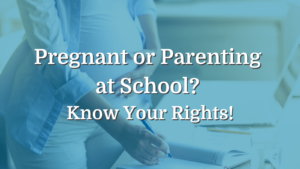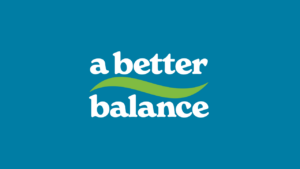Students’ Rights & The Emerging Workforce
Students and young people entering the workforce are at a critical juncture in their lives and careers. While teenagers and young adults might be especially vulnerable to exploitation and a lack of support in the workplace, they also have tremendous power in shaping the future of work and empowering themselves and their communities to exercise their rights and fight for fairer workplaces. We are working to empower students and the workforce of today and tomorrow with the resources and information they need to assert their rights at school and in the workplace, and fight for policy change.

Enforcing Pregnant & Parenting Students’ Rights Under Title IX
Pregnant and parenting students often face unique challenges in balancing their health and caregiving needs while receiving an education and making ends meet financially. Education can help lay the groundwork for workers’ ability to thrive throughout their careers, and we know that ensuring students are supported at school and can learn in an environment free from discrimination and harassment can help them meet their educational goals and ultimately pursue more opportunities in the workforce.
Title IX is the federal law that prohibits sex discrimination in schools receiving federal funds.The law protects students’ rights to be free from discrimination at school and access accommodations for their pregnancies and related conditions, including childbirth recovery and lactation needs. In 2024, the U.S. Department of Education released robust regulations strengthening and clarifying what rights pregnant and postpartum students have under Title IX. We previously submitted a comment calling for a strong final rule, and were pleased to see many of our recommendations incorporated.
UPDATE: On January 9, 2025, a federal district court judge vacated the 2024 Title IX Rule nationwide. For the most up-to-date information about your rights, call A Better Balance’s free and confidential legal helpline at 1-833-NEED-ABB (1-833-633-3222)
It is critical that students navigating pregnancy and parenting understand and are empowered to exercise their legal rights, so they can receive the support they need. To that end, we have released digital know-your-rights guides about Title IX for students in both English and Spanish, and we have expanded our free and confidential legal helpline’s services to assist students with exercising their rights at school, as well as work.
- Pregnant or Parenting at School? Know Your Rights (English)
- ¿Embarazada o en crianza de hijos mientras en la escuela? Conoce tu derechos (Español)
- Sample Title IX Request Letter For Pregnant, Postpartum, and Lactating Students (English)
- Modelo de carta de solicitud del Título IX para estudiantes embarazadas, en período posparto o en período de lactancia (Español)
Advocating for Opportunity Youth & The Emerging Workforce
Young people entering the workforce have the power to create more equitable, supportive workplaces. For young working women, LGBTQ+ workers, and workers of color, protections like paid family and medical leave, pregnancy accommodations, workplace flexibility, and access to paid sick time are especially vital. We also know that a lack of access to these supports keeps many ‘Opportunity Youth’ (young people between the ages of 16-24 years old who are neither in school nor working) from participating in the workforce. If we want to support young people’s ability to enter and remain attached to the workforce, we must ensure they can access policies that help them to remain financially secure, care for themselves and their loved ones, and thrive throughout their careers.
To that end, we have been taking special measures to educate young people about the policies we need for a stronger, more just system of work and care. We have released numerous resources highlighting how workplace protections like paid sick time and paid family and medical leave allow young workers, and their loved ones and families, to be supported. We are also educating the public about how new laws like the federal Pregnant Workers Fairness Act can support a younger workforce, including part-time, seasonal, and temporary workers—positions where young people tend to be overrepresented.
We remain committed to fighting for the protections young workers need, and equipping them with tools to advocate for a more equitable future of the workplace.
Workplace Rights Hub
Featured Resources
Pregnant or Parenting at School? Know Your Rights
Learn about exercising your rights to accommodations at school.
Highlighting the Work-Family Supports Young People and Their Families Need
Resources Articles
More than 5.4 million college students in the United States are parents.
of Gen Z says they have gone to work while sick in the past year.









